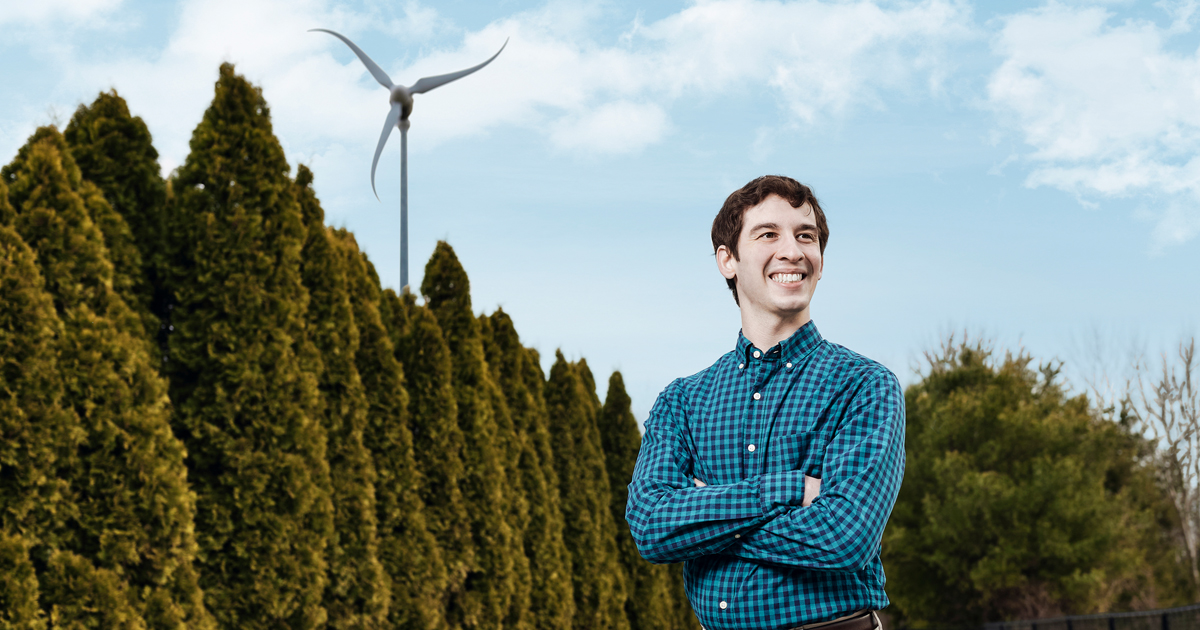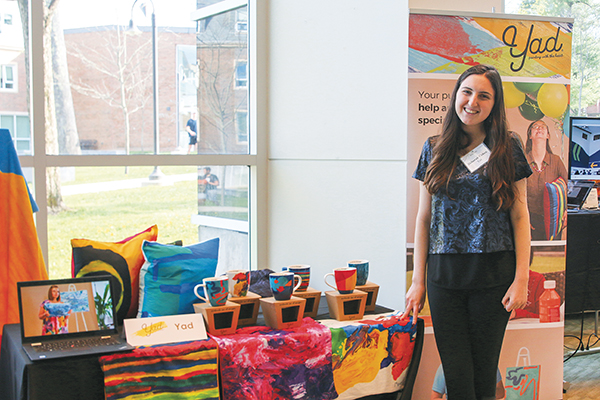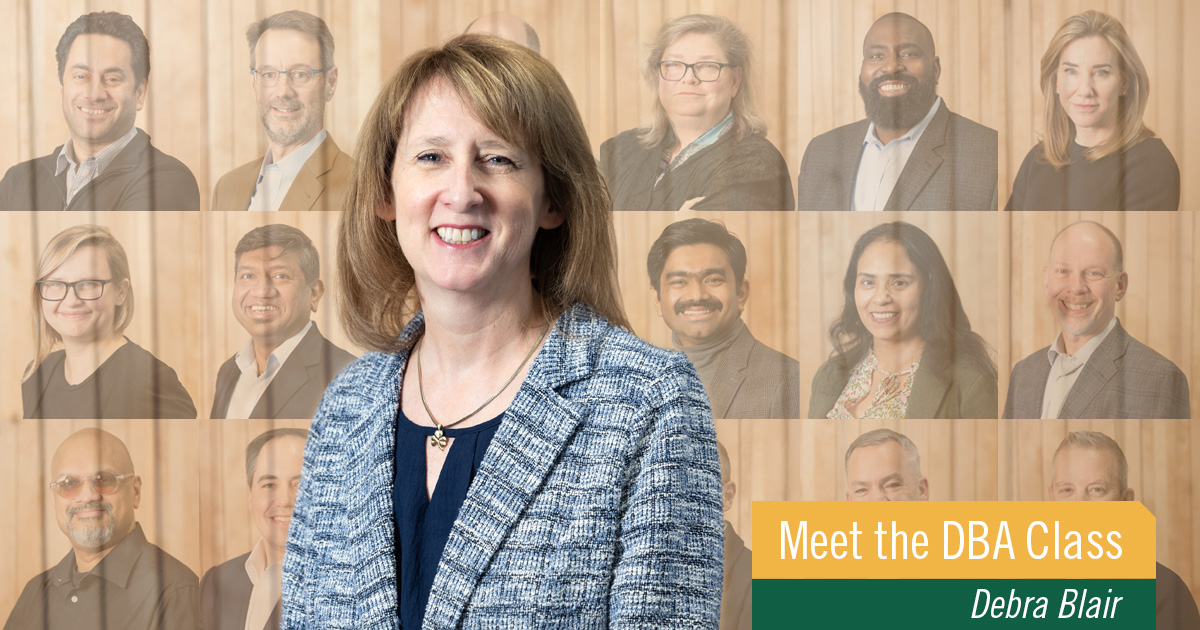More Than Profits: The Importance of Integrated Sustainability

Andrew Lidington ’18 already had the planet on his mind when he began at Babson College as a student. He knew, even as a teenager, that sustainability was critically important.
“I saw it as the foundational issue that affects everyone,” he says. “We have only one planet. That means we can’t mess up.”
But he admits that his understanding of sustainability wasn’t particularly deep or profound. Yes, he knew the world needed to move toward renewable energy, but he didn’t know the many barriers to making that happen. He didn’t grasp, for instance, the role that economics and finance played.
“It’s easy to say you want to do things. It’s another to know how to do them,” says Lidington, a former Arthur M. Blank Scholar and a senior analyst at Sustainable Energy Advantage, a renewable energy consulting firm based in Framingham, Massachusetts. “If we want to change how the current system works, we need to know how it works.”
Lidington learned that at Babson. In one class, he helped set up a miniature wind turbine and studied its energy production. In another, he and his fellow students looked at installing solar panels on a campus building. In yet another class, he and his student group examined ways to improve air quality for people living near major highways in Boston.
READ MORE: Prabaarja Bedi MBA’20 finds opportunity amid waste »
More than learning the hows and whys of sustainability, though, Lidington was taught to think beyond himself and recognize how interconnected the world is. In our careers and day-to-day lives, the decisions we make can reverberate and impact the environment and our communities in ways we might not anticipate.
“Babson helped me connect the dots,” he says. “Everything we do, in one way, shape, or form, is informed by our environment around us, and also affects our environment around us. Everything affects everything else.”
Babson defines this systems thinking, with its emphasis on social and environmental responsibility, as integrated sustainability. In a time of great societal challenges, from climate change to income inequality, integrated sustainability has far-reaching implications for the planet and the people who call it home.
A Way of Thinking
Teaching about the environment and social responsibility certainly is nothing new at Babson. What’s changed in recent years is the way in which these issues are taught at the school. Instead of peripheral concerns, integrated sustainability is considered a central part of how people choose to lead their lives.
“I don’t want to send graduates out into the world who don’t understand this way of thinking,” says Vikki Rodgers, professor of environmental science and chair of the Math and Science Division.
When starting a business or leading a company, integrated sustainability calls for social and environmental concerns to be a part of an organization’s DNA, as essential to its mission as making a profit. Integrated sustainability also calls for these issues to be considered in every aspect of how one leads a life outside the office, from what you invest in, to where you live and how you commute, to where and on what you spend your money.
“We have some frightening ecological and social issues coming up on the horizon. I hope our students change the world. We desperately need them to.”
Vikki Rodgers, professor of environmental science
Rodgers teaches a course focused on integrated sustainability with Stephen Deets, associate professor of politics and the chair of the History and Society Division. That course, Socio-Ecological Urban Systems, looks at how political, environmental, and economic issues are connected in urban areas. “It allows us to focus on lots of specific issues: gentrification, transportation, storm water management, garbage, food,” Deets says.
Through just such a course, Babson is rethinking how business is taught, say Deets and Rodgers, who believe such a shift is necessary. “We hope Babson becomes a model for how business education can and should change,” Deets says.
Quite frankly, a lot depends on the young people in college now. “We have some frightening ecological and social issues coming up on the horizon,” Rodgers says. “I hope our students change the world. We desperately need them to. I think these are the tools they need to make system-wide changes.”
Laying a Foundation
A big way students are introduced to integrated sustainability is through Foundations of Management and Entrepreneurship, or FME, a signature course at Babson where teams of first-year students are taken through the steps of starting their own ventures over the course of a school year.
Danna Greenberg, the Walter H. Carpenter Professor, has taught FME for many years and enjoys watching the tremendous growth students experience during the class. “They are starting to carve their own path of who they want to be at Babson,” the professor of management says.
While FME revolves around starting a business, the goal is not just profit. “Profitability or loss has no connection to your grade,” says Scott Taylor, associate professor of organizational behavior and FME coordinator. Rather, students are taught to think about the business decisions they make and how they impact people and the environment. The hope is that the course serves as a foundation for students as they progress at Babson and beyond.
“We spend a lot of time talking about empathy, about putting yourself in another person’s perspective,” Taylor says. “We’re trying to establish a mindset, a mindset for doing business, that involves having a heightened sense of awareness of context and people.”
“We’re trying to establish a mindset, a mindset for doing business, that involves having a heightened sense of awareness of context and people.”
Scott Taylor, associate professor of organizational behavior and FME coordinator
One of the FME businesses that has taken integrated sustainability issues to heart was Pivot Plastics, which last year sold bracelets made by impoverished women in Mali. The women collected plastic, usually from sandals dumped in riverways and landfills, and melted it over an open fire to make the bracelets.
Pivot Plastics achieved two big goals—reducing waste and giving work to people who need it—and thus illustrated the potential of a company in which integrated sustainability is central to how it operates.
“It’s one thing to donate 10% of your bottom line to a charity,” says Anna Nickerson ’22, who served as the venture’s CEO, “but it’s another thing to integrate that philosophy into all components that touch your business.”
The venture achieved all that while also producing a popular product on campus. Some 1,300 bracelets were sold for $3.19 each. “We were very successful,” Nickerson says.
But, as successful as Pivot Plastics was, it also showed the challenges of implementing integrated sustainability in a business. The venture received its bracelets from a third-party vendor specializing in African imports, and Nickerson and her team realized that they didn’t know enough about the women who were making the bracelets. Were they treated fairly? In what kind of conditions were they working?
“That became a big discussion in our class. If you can’t follow your supply chain, how can you ensure what you’re telling your customers is completely true?” Nickerson says. “As a team, if we were to do this again, we would want to learn more about the women and the supply chain itself.”
Work with Purpose
Babson’s growing emphasis on integrated sustainability is matched by an interest from its students. As she teaches the young adults in FME, Greenberg has noticed a shift in their concerns in recent years. A generation that grew up with economic and political uncertainty and the damaging effects of war and climate change, students today are much more aware of social and environmental issues.

Debbie Cohen ’19 works with artists with intellectual disabilities to create home decor products.
“I think we’re getting a generation of students who are already thinking about their place in society and their communities and their environment,” Greenberg says. “They are already caring about bigger issues.”
Debbie Cohen ’19 was just such a student when she arrived on campus. “I always knew I wanted to help people,” she says. “My mission was always to make the world a better place.”
Cohen is CEO and founder of Yad. Based in Guatemala City, Yad sells home decor products in Central America that showcase the artwork of artists with intellectual disabilities (above). “They have so much potential that people don’t know about,” Cohen says of the artists Yad works with. “I want to empower them.”
Cohen has long had an interest in helping people with special needs and volunteered for years at an art center for people with intellectual disabilities. While Cohen was at Babson, that art center was short of funds and about to close its doors. Deciding to act, Cohen offered to sell the center’s artwork, leveraging the help of her family’s textile business to put that art on towels and cushions. “That was how the idea of Yad got started,” Cohen says.
“My mission was always to make the world a better place.”
Debbie Cohen ’19
While that art center eventually closed, Cohen was able to open another with the same artists. “I love spending time with the artists there,” she says. “That really motivates me.”
Cohen credits Babson for helping make her old idealistic dreams of helping people and making the world a better place a reality. Through the courses and support of the College, she was able to create a venture that not only makes a profit, but also has at its core a higher mission.
“I wanted to work with purpose,” she says. “Babson pushed me to work toward what I wanted.”
Posted in Community




